汉英翻译第二讲词义的选择
- 格式:ppt
- 大小:125.50 KB
- 文档页数:30
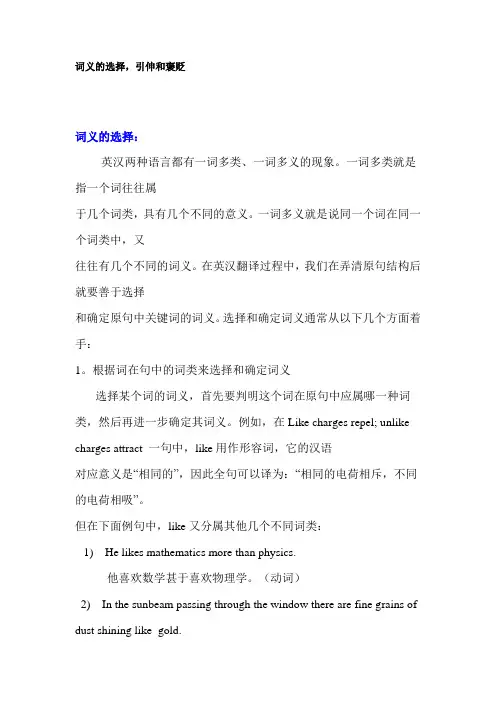
词义的选择,引伸和褒贬词义的选择:英汉两种语言都有一词多类、一词多义的现象。
一词多类就是指一个词往往属于几个词类,具有几个不同的意义。
一词多义就是说同一个词在同一个词类中,又往往有几个不同的词义。
在英汉翻译过程中,我们在弄清原句结构后就要善于选择和确定原句中关键词的词义。
选择和确定词义通常从以下几个方面着手:1。
根据词在句中的词类来选择和确定词义选择某个词的词义,首先要判明这个词在原句中应属哪一种词类,然后再进一步确定其词义。
例如,在Like charges repel; unlike charges attract 一句中,like用作形容词,它的汉语对应意义是“相同的”,因此全句可以译为:“相同的电荷相斥,不同的电荷相吸”。
但在下面例句中,like又分属其他几个不同词类:1) He likes mathematics more than physics.他喜欢数学甚于喜欢物理学。
(动词)2) In the sunbeam passing through the window there are fine grains of dust shining like gold.在射入窗内的阳光里,细微的尘埃象金子一般在闪闪发光。
(前置词)3) Like konws like.英雄识英雄。
(名词)2。
根据上下文联系以及词在句子中的搭配关系来选择和确定词义英语中同一个词,同一词类,在不同场合往往也有不同的含义,必须根据上下文的联系以及词的搭配关系或句型来判断和确定某个词在特定场合下所应具有的词义。
例如“Last”这一形容词:1) He is the last man to come.他是最后来的。
2) He is the last man to do it.他绝对不会干那件事。
3) He is the last person for such a job.他最不配干这个工作。
4)He should be the last(man)to blame.怎么也不该怪他。
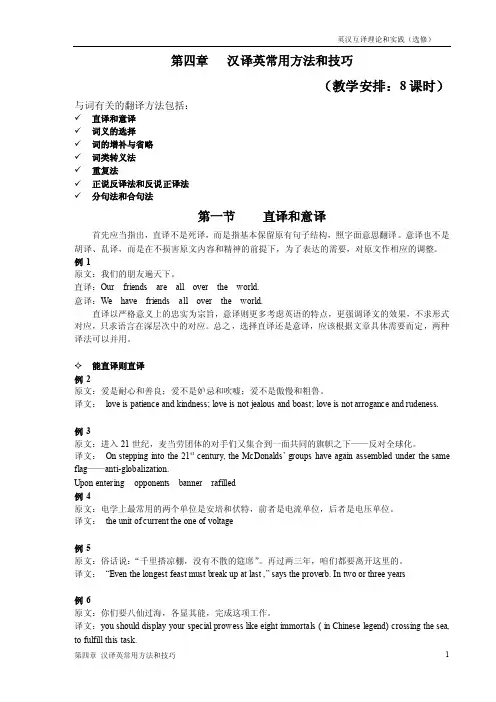
第四章汉译英常用方法和技巧(教学安排:8课时)与词有关的翻译方法包括:✓直译和意译✓词义的选择✓词的增补与省略✓词类转义法✓重复法✓正说反译法和反说正译法✓分句法和合句法第一节直译和意译首先应当指出,直译不是死译,而是指基本保留原有句子结构,照字面意思翻译。
意译也不是胡译、乱译,而是在不损害原文内容和精神的前提下,为了表达的需要,对原文作相应的调整。
例1原文:我们的朋友遍天下。
直译:Our friends are all over the world.意译:We have friends all over the world.直译以严格意义上的忠实为宗旨,意译则更多考虑英语的特点,更强调译文的效果,不求形式对应,只求语言在深层次中的对应。
总之,选择直译还是意译,应该根据文章具体需要而定,两种译法可以并用。
✧能直译则直译例2原文:爱是耐心和善良;爱不是妒忌和吹嘘;爱不是傲慢和粗鲁。
译文:love is patience and kindness; love is not jealous and boast; love is not arrogance and rudeness.例3原文:进入21世纪,麦当劳团体的对手们又集合到一面共同的旗帜之下——反对全球化。
译文:On stepping into the 21st century, the McDonalds’ groups have again assembled under the same flag——anti-globalization.Upon entering opponents banner rafilled例4原文:电学上最常用的两个单位是安培和伏特,前者是电流单位,后者是电压单位。
译文:the unit of current the one of voltage例5原文:俗话说:“千里搭凉棚,没有不散的筵席”。
再过两三年,咱们都要离开这里的。
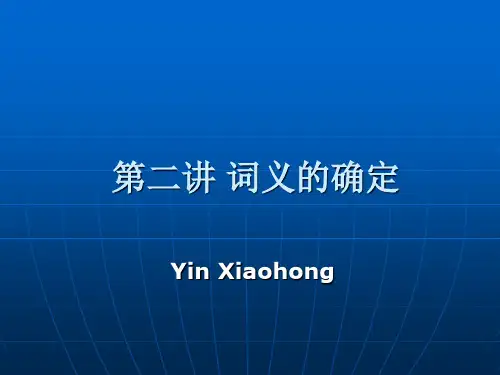
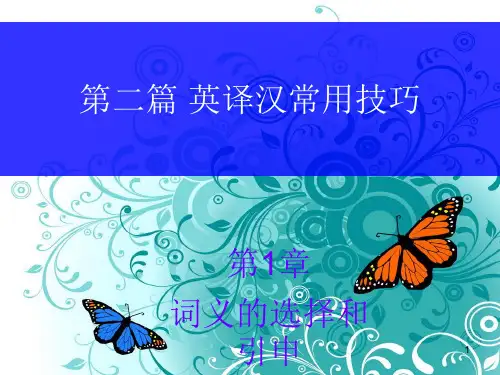
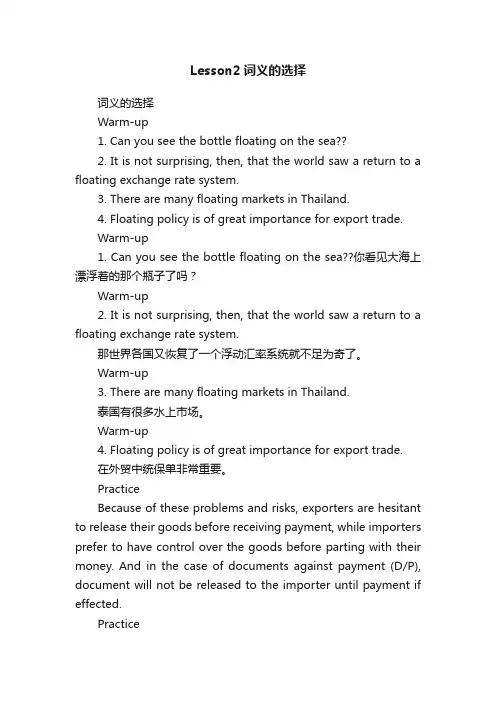
Lesson2词义的选择词义的选择Warm-up1. Can you see the bottle floating on the sea??2. It is not surprising, then, that the world saw a return to a floating exchange rate system.3. There are many floating markets in Thailand.4. Floating policy is of great importance for export trade.Warm-up1. Can you see the bottle floating on the sea??你看见大海上漂浮着的那个瓶子了吗?Warm-up2. It is not surprising, then, that the world saw a return to a floating exchange rate system.那世界各国又恢复了一个浮动汇率系统就不足为奇了。
Warm-up3. There are many floating markets in Thailand.泰国有很多水上市场。
Warm-up4. Floating policy is of great importance for export trade.在外贸中统保单非常重要。
PracticeBecause of these problems and risks, exporters are hesitant to release their goods before receiving payment, while importers prefer to have control over the goods before parting with their money. And in the case of documents against payment (D/P), document will not be released to the importer until payment if effected.PracticeBecause of these problems and risks, exporters are hesitant to release their goods before receiving payment, while importers prefer to have control over the goods before parting with their money. And in the case of documents against payment (D/P), document will not be released to the importer until payment is effected.PracticeBecause of these problems and risks, exporters are hesitant to release their goods before receiving payment, while importers prefer to have control over the goods before parting with their money. And in the case of documents against payment (D/P), document will not be released to the importer until payment is effected.由于存在这样一些问题和风险,出口商在收到货款前是不愿意发货的,而进口商则在付款之前就希望将货物掌控在自己手里。
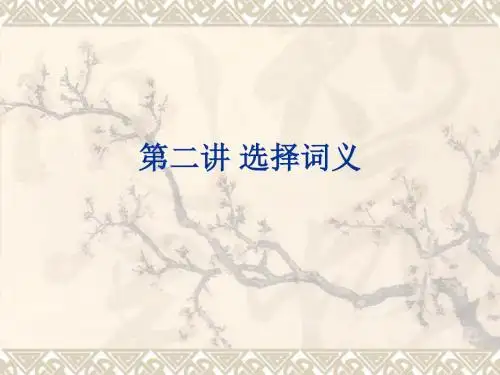
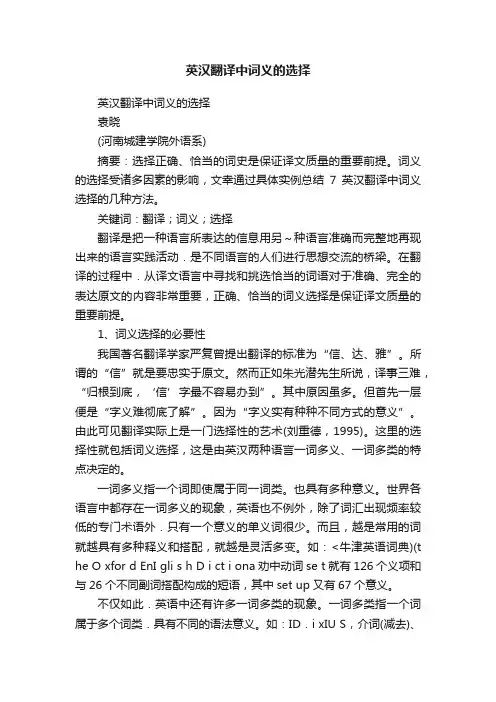
英汉翻译中词义的选择英汉翻译中词义的选择袁晓(河南城建学院外语系)摘要:选择正确、恰当的词史是保证译文质量的重要前提。
词义的选择受诸多因素的影响,文幸通过具体实例总结7英汉翻译中词义选择的几种方法。
关键词:翻译;词义;选择翻译是把一种语言所表达的信息用另~种语言准确而完整地再现出来的语言实践活动.是不同语言的人们进行思想交流的桥梁。
在翻译的过程中.从译文语言中寻找和挑选恰当的词语对于准确、完全的表达原文的内容非常重要,正确、恰当的词义选择是保证译文质量的重要前提。
1、词义选择的必要性我国著名翻译学家严复曾提出翻译的标准为“信、达、雅”。
所谓的“信”就是要忠实于原文。
然而正如朱光潜先生所说,译事三难,“归根到底,‘信’字最不容易办到”。
其中原因虽多。
但首先一层便是“字义难彻底了解”。
因为“字义实有种种不同方式的意义”。
由此可见翻译实际上是一门选择性的艺术(刘重德,1995)。
这里的选择性就包括词义选择,这是由英汉两种语言一词多义、一词多类的特点决定的。
一词多义指一个词即使属于同一词类。
也具有多种意义。
世界各语言中都存在一词多义的现象,英语也不例外,除了词汇出现频率较低的专门术语外.只有一个意义的单义词很少。
而且,越是常用的词就越具有多种释义和搭配,就越是灵活多变。
如:<牛津英语词典)(t he O xfor d EnI gli s h D i ct i ona劝中动词se t就有126个义项和与26个不同副词搭配构成的短语,其中set up又有67个意义。
不仅如此.英语中还有许多一词多类的现象。
一词多类指一个词属于多个词类.具有不同的语法意义。
如:ID.i xIU S,介词(减去)、形容词(负的);r ear形容词(后部的;背后的)、名词(后部,背面)、动词(抚养,饲养);a ss oc i a t e,动词(把……联系在一起;结交)、名词(伙伴,同事,合伙人)、形容词(副的)。
由此可见.词的翻译作为翻译过程中最基本的一个环节.其重要性自不用说。
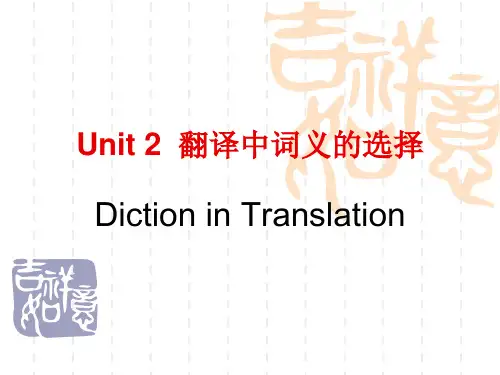


汉英翻译第二章选择词汇一、课后练习检查和讲评他说的一套,做的另一套。
教科书译文:He said one thing and did another.李老师认为教科书译文值得商榷。
Dear John,Please paraphrase (explain) the following sentenses:1.His words betray his actions.2.He dose not keep his words in line with his actions.3.When it comes to drive , she has got more than any one of us.thans!Li Tian-xinBoth 1. and 2. have the same meaning, however, the first (His words betray his actions.) is the more common way to express the concept.What this means is that what you say about a given subject iscontradictory to what you do. As an example ... a boy tells a girl thathe loves her, he can't live without her and various other romantic things. Then this same boy is seen with other girls in an intimate setting - maybe eating dinner, maybe going to a movie, and so on. He says that there is only one girl for him but his actionsprove him a liar - his words betray his actions.3. The word 'drive' here means desire, commitment and faithfulness to start and finish a project of any kind. Itcould be learning to swim, graduating from college (a 4-year commitment takes a lot of 'drive' to complete), even studying for an exam requires'drive' from the students who really want to succeed and achieve good things.A paraphrase of 3. then is: She has more faith, commitment and action in every aspect of her life than any of us.John干劲的英文音标:[ gànjìn ]drive; vigour; enthusiasm: 有头脑、干劲和首创精神的青年young men with brains, drive and initiative; 干劲十足be full of vigour; 冲天干劲boundless energy1.We shall want a real Henry Fordeffort .我们需要有一种真正亨利福特的干劲。
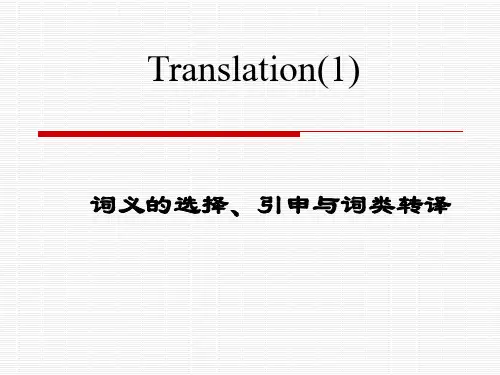
第二讲英汉词义对比与翻译中根据语境选词一、语境与意义的关系概述词是语言中能自由运用的音义结合体,是构成句子的最基本的单位,所以词的意义直接影响读者对句子甚至对整个篇章的理解。
虽然在翻译的过程中一般以句子为翻译单位,但如果不能把词的意思准确地翻译出来,势必会影响到对整个句子甚至对整个篇章的翻译。
由此可见词在翻译中的重要性。
在选词时,我们除了要注意词的基本含义(概念意义)外,也要明白翻译中的选词更多地受到诸多因素的影响。
语境可分为¡°微观语境(Microcontext)¡±和¡°宏观语境(Macrocontext)¡±,前者主要指词的搭配,包括词组、分句、句、句段、文本或篇章、体裁;后者指非语言因素,即社会、文化、历史因素。
同一个词,在不同的语境中,其涵义、词义广狭、感情色彩、文体色彩、文化色彩等不尽相同。
语境决定词的涵义、词义的广狭、词的感情色彩和语体色彩以及文化涵义等。
翻译时必须将语境纳入考虑之中,仔细斟酌,才能真正取得好的翻译效果。
⏹长期以来,中国学生在学习英语的过程中,尤其在学习英语单词的过程中总喜欢通过其汉语意思记忆单词,久而久之,就形成了一种“怪圈”,即一个英语单词对应一个中文意思(一个汉语词),翻译的时候,往往就会将英语单词与汉语词一一对应起来,结果造成翻译中用词不当的现象。
或者,有时在翻译中遇到不知该如何在目的语中进行表达,只靠单纯地查阅英汉词典或汉英词典,结果发现,英语的汉译文不够通顺,搭配不当,汉语的英译文就让人感觉词不达意。
实际上,英语单词与汉语词并非一一对应的关系,而应根据词所在的语境决定词在上下文中的涵义、词义的广狭、词的感情色彩词、词的语体色彩、词的联想意义等,然后根据这些意义在目的与中选择恰当的对应词(eqiuvalent).⏹Leech(利奇)在《语义学》中列举了七种意义类型:概念意义(conceptual meaning)内涵意义(connotative meaning)风格意义(stylistic meaning)情感意义(affective meaning)联想意义(reflected meaning)搭配意义(collocative meaning)主题意义(thematic meaning)⏹概念意义是意义的中心部分,是客观事物的反映与概括,也就是说,概念意义就是词典里收录的释义,具有约定俗成的特点;内涵意义是词汇的喻义和引申意义,是附加在概念意义之上的意义,不同的语境中,词的内涵意义不尽相同;风格意义指在不同的场合中词汇的运用会呈现不同的层次,不同历史时期、不同的说话人、不同的交际手段和方式等都会影响到词汇的风格意义;情感意义用来表达说话者的感情和态度,取决于词所描述的对象;联想意义是能引起听者或读者联想的意义,有些词可以引起愉快的联想,而有的词可以引起不愉快的联想,尤其是在不同的文化中,词的联想意义有很大的区别。